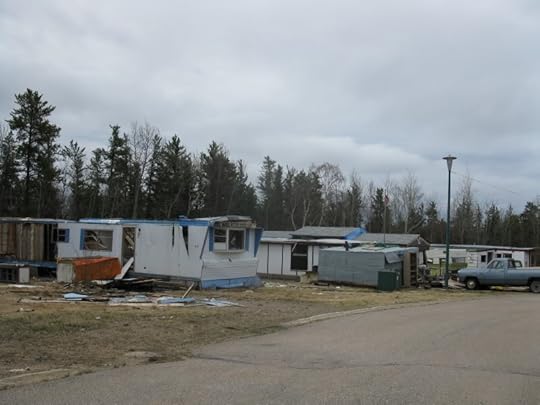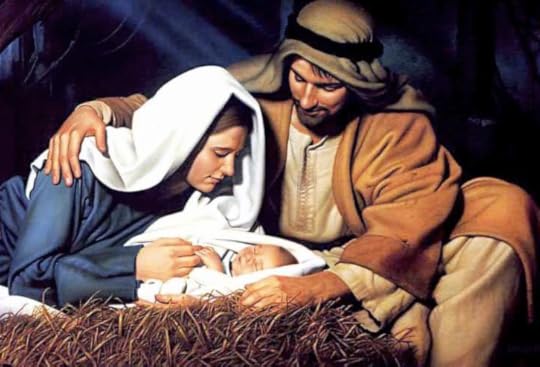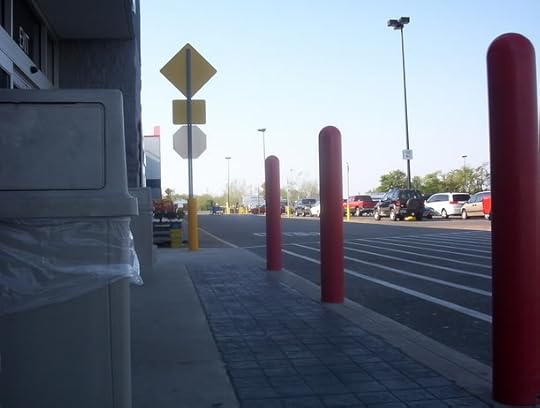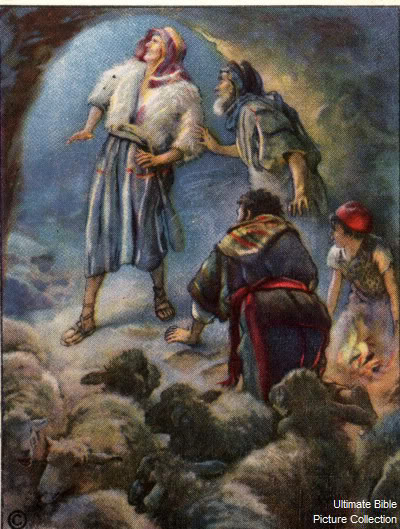Billy Coffey's Blog, page 14
January 8, 2015
A world worth saving

image courtesy of photobucket.com
Piney Mills may sound like a good enough place to live—one of those neighborhoods that offer a mixture of Cape Cods and ranches and the occasional bricked manor home, all with the stars and bars hanging from a pole, each with mats at the front door that say WELCOME. But it’s not like that at all. Piney Mills is instead a sprawling trailer court just outside of town that borders an expanse of national forest that is largely untrodden save for moonshiners, meth dealers, and love-struck teenagers in search of somewhere private to do some heavy petting.
In other words, every town has that one place where you don’t go unless you absolutely have to. For my town, Piney Mills is that one place.
It was a favor for a friend that took me there a couple weeks ago. He had a sofa that needed to be moved, I had the truck to move it. It was a minor errand that would take no more than an hour, but I still dreaded the trip. Piney Mills is an underbelly. When you go there, it’s best to prepare yourself for the things you’ll likely see—the poverty, the want, the neglect, yes. But mostly it’s the crass, profane attitudes the people there have adopted, either because of the sorry states of their lives or their bleak prospects of their futures.
I wasn’t disappointed in that regard. The decayed (and bullet-ridden, I might add) wooden PINEY MILLS sign at the entrance was guarded by a boy no older than six. He was dressed in jeans that were a size too short and a stained sweatshirt that read AUSTIN 3:16 SAYS I JUST KICKED YOUR ASS that was at least three sizes too big. As I pulled from pavement to gravel, he looked at me and offered a tiny middle finger.
I wound my way along the park’s main avenue. Trailers in various states of disrepair offered clues as to what the inhabitants considered important and not. I saw a bevy of duct-taped windows, porches littered with empty beer cases, and pristine satellite dishes clinging to sagging roofs. What few people that mingled about in the cold stared through dead eyes with a mix of resignation and distrust.
The guilt I felt wasn’t because my life had been offered more, but that I had to go to a place like that to be reminded of it.
The sofa in question was colored in a microfiber lime green and seemed to weigh as much as the truck that would transport it. My friend and I managed to hook it out of the narrow doorway and into the bed without causing further damage to either. He offered me coffee that I eagerly accepted. We spent the next half hour talking on his front stoop.
There is a rhythm to every place, even a place like Piney Mills. As the minutes wore on and the talk drifted from Christmas to work, the neighborhood awoke to a point where I was tolerated if not accepted. A woman across the street came outside long enough to wave and ask if we needed further help with the sofa. The man in the trailer beside us walked out to fetch his morning paper. He wore a threadbare purple bathrobe and nothing more. That didn’t stop him from noticing the errant newspaper that straddled the boundary between his trailer and the next, which he promptly delivered to an expectant and thankful elderly woman next door. Children appeared to play football in the street. For a while, even in that sad place, there was the sound of laughter and fun.
I realized then that I’d been missing something besides that appreciation for my life’s bounty. It was an important lesson, one I think is worth sharing here. It is simply that there is still joy in this world, still beauty. Still good. We might believe those things to be sparse and that might be true, but I don’t think so. Even in Piney Mills, that place the local police know well, you can find glimpses of our better selves. You can be reminded that while we are all fallen, dirty, incorrigible people, we are also capable of good and laughter.
I’m going to remember that the next time I turn on the television or pick up a newspaper. I’m going to hang on to that notion the next time my eyes are drawn heavenward and I’m tempted to say Come now, just come on and put an end to all this mess.
Because this world is still worth saving. It’s still worth our faith. It’s still worth living in.
January 5, 2015
A middle finger like mine

image courtesy of photobucket.com
I figure I’m much tool old to bother with New Year’s resolutions. I’ve learned my lesson. So many of their broken bits trail along behind me now, all well-intentioned but doomed to failure. We all strive and wish and work for our own vision of wholeness, however right or wrong that vision may be, and yet we will always be broken. That brokenness, I think, is half of what it means to be human. To try and mend that brokenness nonetheless—to stare ahead into some yet unformed tomorrow and see ourselves becoming the people we are meant to be—that is the other half.
At twelve and on the cusp of thirteen, my daughter suffers no such constraints of worldly wisdom. She not only embraces the concept of resolutions, she devoted much of her Christmas vacation to them. She filled pages upon pages of the small black notebook she carries with wondrous ideas of self-improvement. I cautioned her to narrow things down a bit, cut five pages down to one and then whittle things even further, to a single focus. After much deliberation and crossing out, she announced to me on New Year’s Day her goal for the coming year:
To have a middle finger like mine.
My first thought—God forgive me—was that she meant something along the lines of the lewd gesture to which we are all familiar. Not so. She took my hand and stretched it out, showing me the hump of hard skin just inside the first knuckle of the middle finger on my right hand. She pressed it, then smiled and said, “Feels like a marble. I want one.”
“Doesn’t look too good,” I told her. “Which doesn’t really matter with me, since I’m a guy. Guys tend to think the rougher their hands are, the better. Means they’re doing stuff.”
“I want one,” she said again. “I want to do stuff. Think that’s fine?”
“I think that’s very fine.”
She sat down beside me. A worn nub of a pencil appeared from one of her pockets. That black notebook of hers came out of the other. She opened to a page near the middle and took the pencil in her hand, placing her forefinger along the barrel and wrapping her middle finger around it just so.
I asked, “What are you scribbling?”
“I don’t know. Just words. Sometimes I don’t know what’s gonna come out until it does. Is that bad?”
“Nope,” I said. “I think that’s the best.”
She wrote for twenty minutes maybe, working on those words she didn’t know, working on that writer’s bump she wants on her middle finger. I told her it would take time. Lots of time and lots of scribbling. My daughter doesn’t care.
She says she has stories to tell and everyone does, and if we keep those stories locked up inside us they’ll die and maybe an important part of our hearts will die right along with them. She’s a smart one, my daughter, and wise.
I only told her some of what that hard hump of skin on my finger means. Time and practice, yes, but there is also more and harder. Because if she really wants to tell her stories, my daughter will find the going rough. There is no journey in this life fraught with more peril than the journey inside ourselves, no land more arduous and unexplored, and we cannot ever hope to venture there and return unscathed. Every writer bears ugly scars, just as every person does. The hump on my finger is merely the one most visible.
January 1, 2015
Tidings of comfort
 This Christmas began what I hope will become a new tradition for the Coffey house. On Christmas Eve, my daughter sat at the grand piano in the equally grand foyer of the local hospital. For forty-five minutes, she provided background music to the steady pulse of whispers and footsteps and intercom pages.
This Christmas began what I hope will become a new tradition for the Coffey house. On Christmas Eve, my daughter sat at the grand piano in the equally grand foyer of the local hospital. For forty-five minutes, she provided background music to the steady pulse of whispers and footsteps and intercom pages.
“Silent Night.” “Joy to the World.” “Away in a Manger.” The notes shaky at first, timid, only to gain in both confidence and volume as the moments drew on.
I sat with my son and wife on the worn leather sofa in the middle of the foyer. The perfect spot to listen and nod and smile in support. Also, the perfect spot to see what would happen when those songs of hope and joy were played in such a setting. To see a bit of light cast into such a darkened place.
We were alone for a while. There is a current to every public place, one that flows and meanders of its own accord regardless of what attempts are made to alter it. So we all settled in, us on the sofa and she at the keys, joining the crowd rather than ask the crowd to join us.
The automatic doors leading to the parking lot squeaked with a certain poetic regularity. The people who entered did so with a slow purpose, as if walking through molasses. Their arms ladened with ribboned bags overstuffed with gifts. Plastic smiles that sunk no deeper than the first layer of skin greeted us. Their thoughts were plain enough that I saw them well. It is Christmas, these people thought, and I am here—not at home, but here.
My daughter played: Let every heart/Prepare Him room.
In those small spaces where the elevators clustered, those coming in met those going out. These people, too, could not hide their thoughts. I watched as orderlies pushed the freed in wheelchairs as worn and tired as the smile on the patients’ faces. They were greeted at the doors by family members who rushed in from the circular drive just outside—rushed in, I thought, not to escape the cold, but to rescue their loved ones before some unknown doctor reconsidered the discharge order.
My daughter bolder now, smiling down at the ivory keys: And heaven and nature sing.
A nurse stopped on her way to some far-flung department to listen. An old man sat in the chair across from us, drawn there more by the music than the promise of comfort. The December sun glinted off the wall of windows in front of us. Puffy clouds raced overhead, molded into shapes by the wind. More people stopped—patients and visitors, security officers, doctors. Not for long and only to smile as those notes rang out (Round yon virgin, mother and child) before walking on with a nod and a smile.
And slowly, ever so gently, that current changed.
It was not diverted, nor could it have been. This was a hospital, after all. In such places where so much life mingles with so much death, the heaviness in the air is both constant and unchanging. And yet I saw smiles during my daughter’s recital, and I heard the hard sighs of comfort and the sound of applause.
And I knew then this great truth—we cannot heal what has been irrevocably broken. We cannot bring peace in a life where there will always be war, nor healing to a place fallen from grace. Such things are beyond our ability. We have no such power.
Yet even if we are powerless to change this world, we still have the power to nudge it a bit in the direction it should go. To bring joy to another, even for a moment. To inspire and lift up. To give hope.
To endure.
December 29, 2014
Her favorite gift

image courtesy of photo bucket.com
Ask any kid—or better yet, search your own memory— and you’ll find the most pressing question in the days proceeding Christmas is three one-syllable words:
What’d you get?
I’ve both asked and answered that question hundreds of times in my life (and if I’m honest, I’ll confess to asking and answering it much more now than when I was seven). I think that’s okay. So much is made of how commercial Christmas has become and how secular everything has gotten. Both are valid points. But hey, everyone wants to know when you’ve gotten new stuff.
As for the Coffey household, I’ll say Santa was pretty good to us this year. Some of us would say he was better to us than we deserve. That, too, is okay. What better presents to receive than grace and mercy? Which is pretty much what the world’s presents were on that first Christmas long ago, all wrapped up in bone and flesh and blood.
My son would say we had “a good haul.” A pretty typical response from a pretty average ten-year-old boy. But there’s someone I know who received far more this year, and that’s what I wanted to share.
Many of you know my wife is a teacher. If you have one of those in your life, then you understand my saying that profession could be best described as a thankless one. Lots of work, lots of stress, lots of blame. Sometimes, though, there are those little rays of light that break through an otherwise dour world. One of her co-workers received just that on the last day before Christmas vacation.
This was what a little girl in class delivered to her:

Deciphering a child’s art is an art unto itself. It can often be a tricky thing, even for an experienced teacher. Thankfully, said teacher has spent enough years in a classroom to know just how to coax meaning without offending.
“Tell me about this wonderful picture,” she said.
The girl told her it was the two of them holding hands as they lay upon the playground grass trying to make shapes out of the clouds. The white, winged figure? An angel, of course. It’s a pretty day, she said, but see that swirl of black in the middle on the left side? There’s a bad storm coming. Already, it’s blocking out the sun.
Beautiful, yes? The teacher thought so. My wife thought so. I thought so, too.
But there was more.
As it turned out, the picture was sort of a stocking stuffer—an hors d’oeuvre meant to whet the appetite for the main course to come. The girl pointed to the maroon blob just beneath the angel, which was not a blob at all. It was a special something packaged in a Tootsie-pop wrapper, held in place by a bit of Scotch tape. Then the girl grinned a big, toothy smile.
The teacher peeled the gift from its place beneath the angel, careful not to ball the tape, and unraveled the packaging. The girl shifted her weight from left to right. Stood on her tiptoes. Licked her lips. Kept smiling. If the teacher didn’t hurry up, she thought her student was going to explode with anticipation.
This was what she found inside:

A river rock. Worn smooth by time and polished by two tiny, patient hands.
Cheap, some would say. But not in my town. In my town, we know how hard things have gotten because things have always been that way. There isn’t a classroom in my wife’s school that doesn’t contain children who each day arrive in hand-me-downs so threadbare that they are nearly transparent. Children whose shoes are held together by duct tape. Who are given free lunches because their parents are too poor to feed their children or themselves.
And yet these children still come, every day. They still smile and laugh. They still give out of their hearts and their love, even if it is a rock.
I don’t know what that teacher got for Christmas. She has a husband and grown children who all earn livings. I’m sure she received quite a bit, and rightly so.
But I guarantee you that rock is her favorite of them all.
December 19, 2014
My favorite miracle

image courtesy of photo bucket.com
Quick, tell me your favorite miracle.
Isn’t easy, is it? The Bible is full of them, after all—those sixty-six books of God’s revelation. It is history and theology, philosophy and poetry. From a strictly literary perspective, it’s some of the finest ever produced. And yet the Bible is especially a long collection of miracles, one strung after the other, spanning thousands of years.
So, which is your favorite?
Creation itself, perhaps. The parting of the Red Sea. Jesus feeding the five thousand. Lazarus raised.
Those are only a few, of course. The miracle that came to my mind was Christ’s first (or first recorded, at any rate), while attending a wedding at Cana. It isn’t my personal favorite, though I’ll say His turning water into wine holds a certain significance to me. I’ve felt felt that particular miracle was a bit different than all the others that came after. To me, this one was simply a son wanting to do something for his mother. There is a deep sense of humanity in that small but great act.
Here’s the thing about that miracle: it wasn’t simply that water was changed to wine, it was that something less was made into something more. That seems the general rule. So far as I can tell, miracles follow that pattern of less to greater.
Consider the examples I mentioned earlier. For all its mystery and grandeur, the miracle of creation can be boiled down to the “less” of nothing being transformed into the “more” of everything.
The parting of the Red Sea? Danger to safety.
It was hunger changed to fullness when Christ fed the five thousand.
It was death made into life when Lazarus walked out of his tomb.
That’s the way all miracles are. All but one.
We celebrate this time of year because it commemorates the birth of Christ. It is, to every Christian, a miracle. Think of that miracle in the most rational of terms—Who, What, When, Where, Why, and How—and you’ll find that within that miracle are many more.
Who was born? The Savior of the world.
What happened? An angel appeared to a group of shepherds, some of the poorest people in the world, who became the first witnesses of what had just occurred.
When? According to Paul, God sent forth his son “in the fullness of time.” A wonderful phrase, that. Meaning that it happened just when God meant it to happen, just as with all things.
Where? Bethlehem, so fulfilling a prophecy made centuries before.
Why? So death could become for us not an end, but a door.
How?
Ah, how.
How did all of this happen? I suppose it could only be best described as the miracle of miracles. Because in all the other times before and all the times since, something less was made more. But in this instance, something more was made less. God Himself became man. The all-powerful was changed to pink-skinned and frail.
Amazing, isn’t it? And yet I can think of no truer expression of love than that of a God so big squeezing Himself into a world so small. Of living alongside us and understanding the joys and pains of our short existence. Of dying so that we all may live.
That, friend, is why the birth of Christ is my favorite miracle.
And that is how I can wish you the most happiest of Christmases.
December 15, 2014
Old Saint Fred

image courtesy of photobucket.com
I’ve always had trouble with the parking lot at Wal-Mart. Don’t ask me why. Maybe because it’s so big or my mind is usually on what I need and what aisle I can find it. Not sure. But regardless, a trip there usually concludes with me wandering around looking for my vehicle, thinking that this must be what old feels like.
Take the weekend, for instance. Nice Saturday afternoon. Sunny. Cold but not frigid. Christmastime. And me, wandering around the west end of the parking lot feeling like one of the misfit toys.
As it is the weekend and it’s only another couple weeks until Christmas, the parking lot is full of cars. Squeezing between cars and trucks, I happen upon a green mini-van. The driver is nestled snug in his seat, seatbelt on, and dead to the world.
Lucky guy, I think. Lets his wife go into the throng of crazed discount shoppers. Lets her fight and claw and scream for the last Elmo or Barbie, and then lets her stand in line alone for half an hour while since only three of the forty checkout lines are open. And he gets to snooze in the mini-van.
Then something about him catches my eye. Not something in particular, but overall: longish white hair and beard, red shirt and pants, and a jelly-like pudge in the midsection.
This was no mere guy.
This was Santa.
One of his eyes opens and stares at me staring at him. We’re locked that way for a moment, each trying to figure out what’s going on and what’s happened. I smile. He smiles.
“Hiya,” he says, rolling down the window.
I nod. “Guess if anyone’s tired this time of year, it’d be you.”
He lets out a long exhale, shakes his head, and says, “Buddy, you don’t know.”
Santa, as it turns out, isn’t Santa at all. Fred’s his real name. Just finished his shift at a local store and was on his way home when Mrs. Fred called. Could he stop by Wal-Mart and pick up a few things?
He’d made it, but barely. Having kids sit on your lap for four hours tends to tucker a person out, Fred said. As soon as he put the car in park he felt that warm sunshine streaming through the window. Next thing he knew, he was awake and staring at me.
“Been a rough year,” he told me. “I’m used to kids wanting things, you know? ‘I’d like a truck’ or ‘I’d like a dolly’ or ‘Could you bring me a dinosaur?'”
“What’s the big gift this year?” I asked him.
“Hope,” he said. “Kids want hope.”
Those words stunned me. I swallowed nothing and furrowed my brow.
“What you you mean?” I asked him.
“Shoot, son,” he said. “Take a look around. It’s bad out here. Money’s dryin’ up, parents losin’ their jobs. I had a kid sit on my lap this morning and ask me to find his daddy a job. Had another who just wanted her mommy to stop crying all the time. And one, one said his daddy told him Santa might not come this year, but he knew that since he’d been a good boy, Santa’d have to come and leave him something. And that’s just today. Just today, you see? Hey, don’t get me wrong. I love Christmas. But between you and me, I’ll be glad when this one’s over.”
“Guess so,” I said. “I’ll leave you to your napping, then.”
“Thanks,” Fred answered. “And Merry Christmas.”
“Merry Christmas.”
I found my truck right where I left it and decided to drive by Fred on my way out of the lot. He was asleep again.
My ride home wasn’t filled with Jimmy Buffett’s Christmas Island or Harry Connick Jr.’s When My Heart Finds Christmas. There was instead only silent contemplation.
Hope. That’s what Fred said the kids want this year. I would imagine that’s what a lot of grownups want this year, too.
Sad, isn’t it, that for many people this time of year isn’t a time for hope? For presents, certainly. And for family. But not hope. Christmas was turned into X-mas, which has now been turned into Holiday (that story comes tomorrow). All of this was conceived to keep everyone happy. To include everyone and give no reason for offense. But by doing so, I fear we’ve buried the very hope so many people seek this year.
The hope that was born on Christmas day a couple thousand years ago in a tiny manger in a tiny town. Hope wrapped in a baby.
December 11, 2014
Behold

image courtesy of photobucket.com
So. Things have been a little tough around here lately, and for a variety of reasons. Seems to be that way for a lot of folks this year. Times are tough out there, no doubt about it.
I’ve never understood how anyone could be melancholy during Christmas. To feel a heaviness amidst such beauty seems impossible, and to possess a measure of fear while surrounded by so much joy seems tragic. Such people have always been alien to me. I understand them better now.
The Nativity story is a popular one in our house these days; the kids have fallen into the habit of reciting the first verses of Luke 2 each night before bed. One of my favorite parts of the Bible, Luke 2. It is a fantastic retelling of fact—of shepherds and angels and a big miracle in a tiny baby. Last night as I listened, heart heavy and sadness there, what struck me was the tenth verse:
“But the angel said unto them, ‘Fear not; for behold, I bring you good tidings of great joy which shall be for all people.’”
I imagined those shepherds—alone that night in darkness, guarding their flocks, trying to keep the wolves away. It was likely a tough time for them then, just as it is now for us. It was a life of work and of scraping by, of dealing with loss and hardship. And fear, especially fear. They were trying to keep the wolves away, after all. Maybe that’s why so many of us are afraid, too.
I think it’s fear that lies deep inside our troubles. Fear that the bad things will get worse, that the black hole we’re in will get deeper, and that whatever joy is left for us in this world will be carried away by a cold wind that will leave us shivering.
For a tiny group of shepherds one night long ago, help came in the form of an angel with Good News to tell. But before that News was given came four words that were even more needed, at least for that group of sheep herders in the Bethlehem countryside:
“Fear not; for behold…”
If there is a magic to all the Christmases that have followed that first one (and I have no doubt there is), then the secret to that magic lies in one word—behold.
My problem was that I was familiar with that word but didn’t really know what to behold something truly entailed. My dictionary put it this way:
“To perceive through use of the mental faculty; comprehend.”
In other words, to behold something means not merely to see it, but to ponder it. To seek to understand it.
Our worries and cares shrink not only our hearts and minds, but our vision as well. The more we look upon what we fear, the less we can see of what can comfort. I think that’s why beholding is so important. It involves interest. It requires attention. It demands participation. It means that for one moment we chance a small step outside of ourselves to gaze upon larger things.
So let us—you and I—do just that this Christmas. Let’s take a moment to ponder and wonder and try to comprehend. In that even our sadness will be coated with a sheen of joy, and the angels will proclaim even in our darkness. For the reason we celebrate this time, this Holy Child, is because by His presence the sadness we feel in this life was rendered temporary, and by Him we know that fairer lands await.
Do not be afraid. Behold.
December 8, 2014
Burt’s everlasting legacy
 Say there, Burt.
Say there, Burt.
Been a while, hasn’t it? Since April. Feels like that’s a long way back but I guess it isn’t. Time slips away when you’re not looking. Today gets turned into tomorrow, and nobody can’t help but get dragged along.
There’s mornings I still think you’re around. I see that old trash truck pull around the corner on campus and I think, There comes old Burt. Did that a lot back in the summertime too, even with the memory of your funeral still fresh. Back then it wasn’t so much seeing the trash truck as it was the sound of all those mowers. I’d hear one fire up outside the bookstore or down by the Administration building and I’d just wait, tub full of mail in my hands, for you to come on by. I’d wait so I could say hey and you could talk about your truck and how good the college looked. Nothing ever much more than that, just two guys passing the time. And then you’d always say, “Well, I gotta go make myself useful. Hey, I’ll see you.”
You remember that? I swear I can still hear it. Heard it back then too, last summer. I’d hear that mower and I’d think, There comes old Burt. And then I’d think, No, Burt’s not around anymore.
I don’t know for sure, but I’d say I’m not the only one who does that. We all took your passing hard.
Some people say those gone to heaven know nothing of those left behind. Others say the departed can see every tear and smile their loved ones offer. I hope the second is true. I hope you got to see all those people crowding the inside of that church back in April, the ones who knew you and loved you and called you a friend. You always said you were a simple kind of man. That might be true. But for a simple man, you sure touched a lot of lives.
Christmastime’s here, Burt. Crazy how that’s snuck up on us, but it has. I got to looking for you even more these past weeks. Everybody knew what time of year it was when December first rolled around and you started wearing that Santa hat. This was always your favorite holiday, wasn’t it? You always said Christmas was the one time of the year when everybody acted like they enjoyed each other.
So I guess this made it the perfect time for everyone at the college to gather last week and remember you. Because we miss you, sure, but also because we want to make sure some part of you remains even if the very best of you is now elsewhere.
Your boys in the shop planted this tree in your honor, out by the fountain and the fire pit, right where everyone can see. It’s a Norway spruce. You know all about evergreens, so I don’t need to say more. But I think it’s a fine thing they picked a symbol of both Christmas and eternal life—two things you enjoyed the most. They even put some lights on it. We’ll do that every year from here on out. That’s your tree, Burt.
And you know what I’ve been thinking? Having this tree here means you’re being useful still. This evergreen will be here long after the rest of us are gone. It’ll grow tall and wide and give shade in the summer and shelter in the winter. The robins will sit in its limbs and sing of spring. Come fall when all else looks dead and gone, you’ll still look green and alive. You’ll stand straight against the wind, pointing to the sky, reminding us all the way to home.
That little ceremony was a beautiful thing to see, Burt. The day as cold and damp and there were more than a few tears shed, but that’s how the beautiful things are—they hurt you in a way that makes you feel good. I like to believe all wounds heal eventually. If not in this life, then surely in the next. But that doesn’t mean those wounds won’t heal to a scar. That’s how it’ll be with all of us. We’ll get on because that’s what we’re supposed to do. We’ll ride our todays on to our tomorrows. But I’m sure there will always be plenty like me who will stop by this tree and have a word from time to time.
In the meantime, though, I guess I better get going . . . make myself useful.
But hey, I’ll see you.
December 4, 2014
Looking for Baby Jesus

The thing about living at the foot of a mountain is that it’s often windy. Sometimes it’s little more than a gentle breeze that will tousle your hair. Other times it’s enough to make you pull your ball cap down a little tighter. And then there are the winds that don’t simply blow but rage. Like the ones last Wednesday.
I was outside the next morning surveying the damage, which wasn’t all together bad. The only things out of place were a few of the Christmas decorations—two bows that had found their way into the rose bushes, a strand of lights that had been blown from the tree, and a toppled Nativity scene.
The bows and lights were simple enough, though I had to impale my thumb on a thorn and smack myself in the face with a tree branch in order to set aright what the wind had blown askew. Mary, Joseph, a wise man, and a shepherd had dog piled the holy child to shield him from harm.
I stood the shepherd up first, brushing away a few leaves and a clump of mud. Then the wise man, then Joseph, and finally Mary. Then I stooped down to brush off little Emmanuel.
Halfway into my crouch, I stopped. In a strange act of contortion I didn’t believe was possible, I both furrowed my brow and bulged my eyes at the sight before me. Because there, right there where the swaddled babe was supposed to be, was nothing.
The rusty gears in my head began to lurch and churn, the results of which seemed to be subtle variations of one question—And what’s that mean?
And what’s that mean? The dog pile didn’t work.
And what’s that mean? My Baby Jesus is gone.
And what’s that mean? Uh-oh.
I stood up and looked around. Nothing. Looked under the truck and around the corner of the house and in the neighbor’s yard and by the creek. Nothing.
A chill ran down my spine that could have either been panic or the last remnants of the cold December wind the night before. How could we have Christmas without the Baby Jesus? What now?
I entertained a brief thought that I should call in and take the day off (“Jesus is MISSING!” I would say). But I didn’t. I wasn’t worried. After all, I’d found the real one. Surely I could find a plastic one, too.
Surely. Maybe. Well, hopefully.
I didn’t get much done that day; I was paid more for eight hours of worry and dread than actual work. My children were ignorant of the situation for obvious reasons. A missing Baby Jesus would bring the sort of panic that children display in tears and snot. Which meant I would have to find him before they knew he was missing.
I went home that afternoon and searched the entire neighborhood. I knocked on doors (“Have you found Jesus?” I asked, and received many wonderful answers. And one that was not so wonderful). I made phone calls. I drove, and when that didn’t work I walked. I even resorted to calling out His name—“Jesus?” “JESUS??”
Still? Nothing.
I had given up and begun preparing my failed-father speech to the family when I spotted a hunk of plastic beneath an evergreen tree. I’d be lying if I said there was a golden ray of light shining down upon it, but it sure felt that way. I sprinted over to the tree, pulled back a dangling branch, and lo and behold, there he lay in peaceful plastic slumber.
My Baby Jesus is back where he belongs now, safely tucked just under the living room window with ma and pa watching over him. And also two carefully placed stakes holding him in place.
I just checked on him. Still there. But a thought came to my mind as I peered through the curtains—shouldn’t I be more mindful of where the real Jesus is than my plastic one? Shouldn’t I make sure that He, too, is right beside me? And in those times when I find He isn’t, shouldn’t I go looking for Him with the same sense of purpose and urgency that I did with a simple Christmas decoration?
Yes, I think. Very much so.
Because the winds rage not just outside my window, but inside my heart, too. They howl doubt and blow jealousy. They gust fear. And while those winds can never blow Jesus away from me, they’ve been known upon occasion to blow me away from Him.
Oh, and yes. If you’ve by chance read my latest novel In the Heart of the Dark Wood, you’ll notice that this tale may have a familiar ring to it. What can I say? To a writer, everything is a potential story.
December 2, 2014
The last thing I’d ever write

The note above was penned by an eighty-five-year-old man named Robert. One day last month, he drove his car down a steep rural road to look at a pond. When he tried to drive back the way he came, the car rolled off the path and became mired in a ravine.
Robert was unable to walk out of his situation due to back problems that left him only able to get around with the help of a walker. He had no food. The only water he had barely filled an 8 ounce bottle. He honked his horn until the car battery was depleted.
Robert sat there, alone in his car, for two days.
With no food, little water, and temperatures in the upper 90s, he realized things didn’t look good. So he grabbed a pen and began writing on the car’s armrest.
Look closely and you can make a bit of it out. The first—and Robert said the most important—was that he make sure everyone knew it was an accident. Robert didn’t want anyone thinking he committed suicide. He wrote that the car’s wheels spun out. He asked that his family give him a closed casket.
About forty hours later, Robert was found. Turns out that final note wasn’t needed after all. As you can imagine, the whole ordeal changed him. Robert has a new outlook on life. He understands its delicateness. He knows every moment is precious.
It’s a good story with a happy ending. But me, I can’t stop thinking about that note.
What would I tell my family? What would I tell you? What would I say if I could never say anything more? Those questions have preyed on my mind since reading Robert’s story. I figured the only way I could start thinking about something else is to go ahead and write my letter.
So here it is, the last thing I’d ever write:
Dear All,
I don’t know how I managed to get myself in this mess. I think a lot of times you can’t see the trouble that’s coming until it’s on you. This is probably one of those times. I guess I should hurry. I never used to think much about time. Suddenly, time seems pretty important.
To my family, I want to say that the very last thing I want to do is leave you behind. You need to know that as much as I’m ready for heaven, I’m thinking the angels will have to drag me there. But don’t worry, I’ll find me a bench somewhere near the gate and wait for each of you.
To my wife, I’m sorry I was never the man I wanted to be. I’m thankful you overlooked that. Take care of the kids. Raise them to believe like you and fight like me.
To my son, there are few things more difficult in life than knowing how to be a man. I’ll give you a quick summary—work hard, laugh much, pray often. Love dignity rather than money. Face your darkness. Let your word be your bond. You’ll do well in life if you cling to those things. Know that I will always be proud of you.
To my daughter, you’ve taught me more about faith than anyone I’ve ever known. Remember this: we seldom have any choice as to the wars we must fight, we can only elect to face them with honor or cowardice.
To my friends, I know it may appear at times that I prefer silence to speech and solitude to company, but you mended the gashes I had rent into my own heart. Whatever goodness is in me was fostered by you.
I ask that you dispose of my remains as you see fit. I have no preference. Whatever flesh and bone is left behind is not me, it is merely an empty house that God has deemed I’ve outgrown.
Do not mourn, laugh.
Do not look back, look forward.
Live intently.
And last, know that all that separates the two of us is but one stroke of heaven’s eternal clock. Life is but a dream. Death is simply when we wake.




